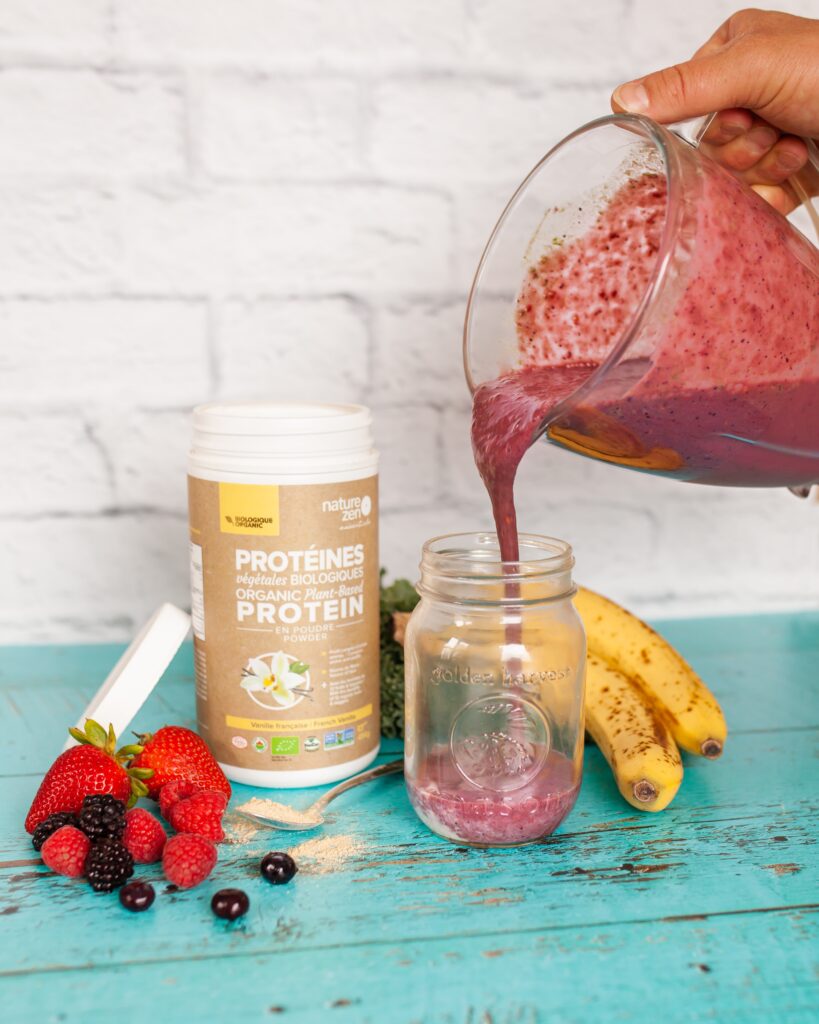Protein powders have long been associated with bodybuilders and fitness enthusiasts, but they have now become more accessible and mainstream. Available in most supermarkets, these powders can be made from animal or plant sources, offering a wide range of options for consumers. With around 20-25 grams of protein per serving, protein powders can help meet daily protein needs and provide a convenient way to boost protein intake. They can be used as an alternative to protein-containing foods or to increase the protein content of dishes that are low in protein. While animal-based protein powders are easier to digest and offer essential amino acids, plant-based options provide additional health benefits such as blood glucose, insulin, and appetite regulation. However, there are concerns about heavy metal contamination in protein powders, so it is important to choose brands that undergo testing and have lower levels of contaminants. When selecting protein powder, plain, unflavored, and unsweetened options with minimal additives are recommended, and plant-based options can contribute to a more balanced diet. Protein powders can be used in a variety of recipes, from smoothies to desserts, but it is essential to prioritize whole, nutrient-rich foods as the primary source of protein and consult healthcare professionals before starting any supplements.

Protein Powders: Not Just for Bodybuilders
Protein powders have often been associated with bodybuilders and fitness enthusiasts, but they are no longer limited to niche stores. Nowadays, protein powders can be found at mainstream supermarkets, making them accessible to a wider range of individuals. Whether you’re an athlete trying to meet your protein needs or simply looking for a convenient way to boost your protein intake, protein powders offer a convenient and versatile option.
The Accessibility of Protein Powders
Gone are the days when protein powders were only available at specialty health food stores. Today, you can find a variety of protein powders at mainstream supermarkets, making them easily accessible for anyone who wants to incorporate more protein into their diet. This increased availability allows individuals who may not have access to specialty stores to benefit from the convenience and versatility that protein powders offer.
Different Types of Protein Powders Available
Protein powders can be made from different sources, including animal and plant sources. Animal-based protein powders are typically derived from sources such as whey, casein, and egg protein, while plant-based protein powders are made from ingredients like pea, brown rice, and hemp protein. Each type of protein powder has its own unique characteristics and benefits, allowing individuals to choose the option that best suits their dietary preferences and needs.
Brands and Options Available at Mainstream Supermarkets
With the increasing popularity of protein powders, mainstream supermarkets now offer a wide range of brands and options to choose from. Whether you prefer animal-based or plant-based protein powders, you can find a variety of brands that cater to different dietary preferences and requirements. It’s important to read labels and select protein powders that are plain, unflavored, and free from unnecessary additives or sweeteners. This allows you to have more control over the ingredients you consume and ensures you’re getting the most out of your protein powder.
Protein Powders Can Be Made from Animal Sources or Plant Sources
When it comes to protein powders, there are two main categories: animal-based and plant-based. Animal-based protein powders, such as whey, casein, and egg protein, are widely popular due to their high protein content and excellent amino acid profile. On the other hand, plant-based protein powders, such as pea, brown rice, and hemp protein, have gained popularity among individuals following vegetarian or vegan diets. Each type of protein powder has its own advantages and considerations.
Animal Sources: Whey, Casein, and Egg Protein
Animal-based protein powders, such as whey, casein, and egg protein, are derived from animal sources. Whey protein, in particular, is one of the most popular and widely studied forms of protein powder. It is a complete protein, meaning it contains all the essential amino acids necessary for muscle recovery and growth. Casein protein, which is derived from milk, is a slower-digesting protein that provides a sustained release of amino acids. Egg protein is another high-quality protein powder option, offering a complete amino acid profile.
Plant Sources: Pea, Brown Rice, and Hemp Protein
Plant-based protein powders have gained popularity in recent years, thanks to the increasing number of individuals choosing vegetarian or vegan lifestyles. Pea protein, brown rice protein, and hemp protein are three common plant-based options. Pea protein is easily digestible and hypoallergenic, making it suitable for individuals with dietary restrictions or sensitivities. Brown rice protein is rich in fiber and may offer additional benefits related to gut health. Hemp protein is a complete protein and contains essential fatty acids, making it a popular choice among health-conscious individuals.
It’s important to note that while both animal-based and plant-based protein powders can contribute to your protein intake, they may differ in terms of digestibility, amino acid profile, and additional health benefits. Choosing the right type of protein powder depends on your dietary preferences, goals, and individual considerations.

One Serving of Protein Powder Provides around 20-25 Grams of Protein
Protein powders are a concentrated source of protein, typically containing around 20-25 grams of protein per serving. This means that by consuming just one serving of protein powder, you can significantly contribute to your daily protein needs. The Recommended Dietary Allowance (RDA) for protein is currently set at 0.8 grams per kilogram of body weight per day. However, it’s important to note that individual protein needs may vary based on factors such as activity level and age.
Understanding Protein Content in Protein Powders
Protein content is a key consideration when choosing a protein powder. Different brands and types of protein powders may vary in their protein content, so it’s important to read the nutrition label to ensure that you’re getting the desired amount of protein per serving. Most protein powders provide around 20-25 grams of protein per serving, but this can vary depending on the brand and specific product.
How It Contributes to Daily Protein Needs
Meeting your daily protein needs is crucial for maintaining and repairing body tissues, supporting immune function, and promoting overall health. By consuming one serving of protein powder, you can easily supplement your daily protein intake. This is particularly beneficial for individuals who may struggle to meet their protein needs through whole food sources alone. However, it’s important to remember that protein powders should not be relied upon as the sole source of protein in your diet, and it’s always best to prioritize whole, nutrient-rich foods.
Benefits of Consuming Sufficient Protein
Protein is an essential nutrient that plays a crucial role in various bodily functions. Consuming sufficient protein has been associated with numerous health benefits. It can help support muscle growth and repair, enhance satiety and promote weight management, support bone health, and improve recovery and immune function. By incorporating protein powders into your diet, you can ensure that you’re providing your body with an adequate amount of protein to support these important functions.
Protein Needs May Vary Based on Activity Level and Age
Individual protein needs can vary based on factors such as activity level, age, and overall health status. While the RDA for protein is set at 0.8 grams per kilogram of body weight per day, this recommendation may not be sufficient for all individuals. It’s important to consider your personal needs and adjust your protein intake accordingly.
Recommended Dietary Allowance (RDA) for Protein
The RDA for protein is a general guideline that provides an estimate of the protein needed to meet the requirements of most healthy individuals. However, it’s important to note that this recommendation may not be optimal for everyone. Individuals who engage in regular physical activity, such as athletes, may require higher protein intakes to support muscle recovery and growth. Additionally, older adults may have higher protein needs to prevent age-related muscle loss.
Factors Influencing Protein Needs
Protein needs can be influenced by a variety of factors. Physical activity level, body composition goals, age, and overall health status can all impact individual protein requirements. Individuals who engage in intense workouts or endurance activities, such as weightlifting or long-distance running, may require higher protein intakes to support muscle repair and growth. On the other hand, individuals who are older or undergoing certain medical conditions may require additional protein to prevent muscle loss and support overall health.
Adjusting Protein Intake Based on Individual Requirements
To determine your individual protein needs, it’s best to consult with a healthcare professional or registered dietitian who can assess your specific needs and help you develop a personalized nutrition plan. They can take into account factors such as your activity level, age, and overall health status to provide you with tailored recommendations for protein intake. This will ensure that you are meeting your individual needs and optimizing your overall health and performance.

Protein Powders Can Boost Protein Intake and Be Used as an Alternative or to Increase Protein Content
Protein powders offer a convenient and versatile way to boost protein intake. They can be used in various ways, either as a substitute for other protein-containing foods or to increase the protein content in dishes that are low in protein. Whether you’re looking to add protein to a smoothie, bake a high-protein treat, or simply increase the protein content of your meals, protein powders can be a valuable addition to your diet.
Supplementing Protein Intake with Protein Powders
Protein powders can be a quick and easy way to supplement your protein intake. If you struggle to meet your protein needs through whole food sources alone, adding protein powder to your diet can help bridge the gap. Protein powders can be mixed with water or your choice of liquid, making them a convenient option for on-the-go individuals. By incorporating protein powders into your daily routine, you can ensure that you’re providing your body with the protein it needs to support various bodily functions.
Using Protein Powders as a Substitute for Protein-Rich Foods
In some cases, individuals may choose to use protein powders as a substitute for other protein-rich foods. For example, vegans or individuals with dairy allergies may opt for plant-based protein powders as an alternative to animal-based proteins like meat or dairy products. This allows them to meet their protein needs without compromising their dietary preferences or restrictions. It’s important to remember that while protein powders can be a convenient option, they should not replace a varied and balanced diet centered around whole, nutrient-rich foods.
Enhancing Protein Content in Dishes with Protein Powders
In addition to using protein powders as a supplement or alternative, they can also be used to increase the protein content of dishes that are naturally low in protein. For example, you can add protein powder to smoothies, pancake or waffle batter, oatmeal, soups, or even baked goods. This not only increases the protein content of the dish but also adds flavor, texture, and nutritional value. Protein powders can be a versatile ingredient that allows you to get creative in the kitchen while effectively meeting your protein needs.
Animal-Based Protein Powders Are Easier to Digest and Have Higher Essential Amino Acids
Animal-based protein powders, such as whey, casein, and egg protein, have long been popular among athletes and fitness enthusiasts. They are well-known for their excellent digestibility and high content of essential amino acids, which are the building blocks of protein.
Digestibility of Animal-Based Protein Powders
One of the advantages of animal-based protein powders is their high digestibility. Animal-based proteins are easily broken down and absorbed by the body, allowing for efficient muscle recovery and growth. This is especially beneficial for individuals who engage in intense physical activity, as their protein needs are increased and efficient digestion and absorption become crucial.
Essential Amino Acids and Their Importance in Protein
Proteins are made up of amino acids, and essential amino acids are the ones that the body cannot produce on its own and must be obtained through the diet. Animal-based protein powders are rich in essential amino acids, which makes them a valuable source of high-quality protein. These essential amino acids play a vital role in muscle protein synthesis, immune function, and overall health and well-being.
Advantages of Animal-Based Protein Powders
Animal-based protein powders offer several advantages compared to plant-based options. In addition to being highly digestible and providing a complete amino acid profile, animal-based protein powders have been shown to support muscle protein synthesis more effectively than plant-based protein powders. They also tend to have higher levels of certain essential amino acids, such as leucine, which is known for its role in muscle protein synthesis. These factors make animal-based protein powders a popular choice among athletes and individuals looking to maximize muscle recovery and growth.
Plant-Based Protein Powders Offer Health Benefits Related to Blood Glucose, Insulin, and Appetite Regulation
Plant-based protein powders have gained significant popularity in recent years, as more individuals opt for vegetarian or vegan diets. In addition to being a suitable protein source for those following plant-based lifestyles, they also offer unique health benefits related to blood glucose control, insulin response, and appetite regulation.
Health Benefits of Plant-Based Protein Powders
Plant-based protein powders, such as pea, brown rice, and hemp protein, are rich in fiber and other plant compounds that offer additional health benefits. These powders can help promote feelings of fullness and satiety, ultimately supporting weight management. The fiber content in plant-based protein powders can also aid in digestion and promote overall gut health. Additionally, plant-based protein powders have shown potential benefits in managing blood glucose levels and improving insulin sensitivity, making them a valuable option for individuals with diabetes or those looking to regulate their blood sugar levels.
Impact on Blood Glucose Levels
Plant-based protein powders, especially those high in fiber, have been shown to have a positive impact on blood glucose levels. Consuming protein as part of a meal or snack can help slow down the absorption of carbohydrates, preventing rapid spikes in blood sugar levels. This is particularly important for individuals with diabetes or anyone looking to maintain stable blood glucose levels throughout the day.
Influence on Insulin Response and Appetite
Plant-based protein powders have also been found to have a positive influence on insulin response and appetite regulation. Protein-rich meals or snacks can help increase feelings of fullness and satiety, reducing the chances of overeating and promoting more mindful eating habits. Additionally, studies have shown that plant-based protein powders may have a beneficial effect on insulin sensitivity, helping to maintain healthy blood sugar levels and supporting overall metabolic health.
While animal-based protein powders offer their own set of benefits, plant-based protein powders can be a valuable addition to any diet, particularly for those looking to support blood glucose control, improve insulin sensitivity, and regulate appetite.
Concerns about Heavy Metal Contamination in Protein Powders
Concerns about heavy metal contamination in protein powders have been raised in recent years. Some studies have shown that certain protein powders may contain elevated levels of heavy metals, such as lead, arsenic, and cadmium. These heavy metals can accumulate in the body over time and may have adverse health effects.
Understanding the Issue of Heavy Metal Contamination
Heavy metal contamination in protein powders can occur due to various factors, including the raw materials used, manufacturing processes, and environmental contamination. While the levels of heavy metals in most protein powders are generally within safe limits, some brands and products have been found to exceed these limits. It’s important to note that the risks associated with heavy metal contamination are generally low, especially if protein powders are consumed in moderation and as part of a balanced diet.
Brands Testing Their Protein Powders for Contaminants
To address the concerns about heavy metal contamination, some protein powder brands have implemented rigorous testing procedures to ensure the safety and quality of their products. These brands conduct third-party testing to verify the absence of heavy metals and other contaminants. Choosing protein powders from reputable brands that prioritize quality control and transparency can help mitigate the risk of heavy metal contamination.
Choosing Protein Powders with Lower Levels of Contaminants
When selecting a protein powder, it’s important to consider its safety and quality. Look for protein powders that have been tested for contaminants and have lower levels of heavy metals. Opting for plain, unflavored, and unsweetened protein powders with minimal additives can also reduce the likelihood of heavy metal contamination. Additionally, diversifying your protein sources and incorporating a variety of protein-rich foods into your diet can help minimize potential exposure to heavy metals and other contaminants.
Prioritizing Whole, Nutrient-Rich Foods and Consulting Healthcare Professionals
While protein powders can be a convenient and effective way to boost protein intake, it’s important to prioritize whole, nutrient-rich foods as the main source of protein in your diet. Protein-rich foods such as lean meats, poultry, fish, eggs, dairy products, legumes, and nuts and seeds offer a wide range of nutrients beyond protein, including vitamins, minerals, and healthy fats.
Emphasizing Whole Foods as the Primary Protein Source
Whole, nutrient-rich foods should form the foundation of your diet, providing you with essential nutrients and promoting overall health and well-being. While protein powders can play a valuable role in meeting your protein needs, they should not replace whole foods. Aim to include a variety of protein-rich foods in your diet to ensure you’re getting a comprehensive range of nutrients.
The Role of Protein Powders as a Supplement
Protein powders can serve as a supplement to accompany your whole food protein sources. They can be beneficial in situations where meeting protein needs through whole foods alone may be challenging, such as during travel or times of increased physical activity. However, it’s important to use protein powders as a supplement rather than a replacement for whole foods.
Consulting Healthcare Professionals Before Starting Supplements
Before incorporating protein powders or any other dietary supplements into your routine, it’s essential to consult with a healthcare professional or registered dietitian. They can assess your specific needs, dietary habits, and health goals to provide you with personalized guidance. Healthcare professionals can help ensure that protein powders are appropriate for your individual circumstances and make recommendations tailored to your unique needs.
In conclusion, protein powders are no longer exclusive to bodybuilders and can be found at mainstream supermarkets. They can be made from animal or plant sources, offering a wide range of options to suit different dietary preferences. Protein powders provide a convenient way to boost protein intake and can be used as an alternative or to increase protein content in various dishes. Animal-based protein powders are easily digestible and offer higher essential amino acid content, while plant-based protein powders offer additional health benefits related to blood glucose, insulin response, and appetite regulation. It’s important to be mindful of heavy metal contamination in protein powders and choose brands with testing procedures in place. Prioritizing whole, nutrient-rich foods and seeking professional advice are essential for a well-rounded and balanced approach to protein consumption. By considering these factors and making informed choices, individuals can incorporate protein powders into their diet to support their protein needs and overall health and well-being.
